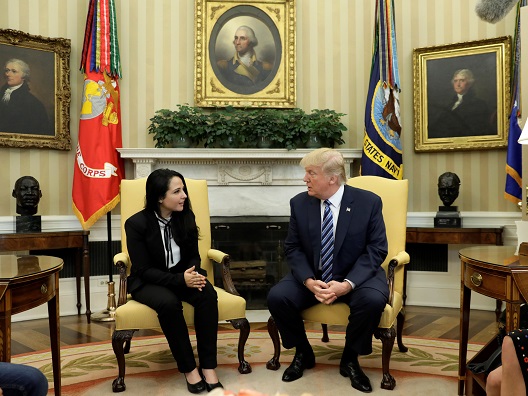 President Donald Trump did not waste time boasting about his role in the release of Aya Hijazi, Egyptian-American charity worker who had been jailed in Egypt for the past three years.
President Donald Trump did not waste time boasting about his role in the release of Aya Hijazi, Egyptian-American charity worker who had been jailed in Egypt for the past three years.
“Did you see Aya?” Trump asked an Associated Press reporter at the beginning of his interview this week.
“I asked the government to let her out,” he said, “You know Obama worked on it for three years, got zippo, zero.”
Hijazi was arrested in 2014 with her husband, Mohamed Hassanein, and six other staffers from the Belady Foundation, an NGO they founded to support street children. They faced charges of running an unlicensed organization, inciting street children to join pro-Muslim Brotherhood protests and sexually assaulting minors. The defendants had been long vilified by local media, which branded the trial “the human trafficking case.”
Almost three years later, she is sitting in the Oval Office with Trump, posing for the same cameras Egyptian President Abdel Fattah al-Sisi had posed for only two weeks before her.
Trump is not wrong. Foreign calls for Hijazi’s release have mounted over the past years, alas to no avail, especially after her detention had exceeded the legal two-year limit set for pre-trial detention, with the trial being continuously postponed.
In September 2016, the White House released a statement after then Deputy National Security Advisor Avril Haines met with Hijazi’s family. The statement reiterated the US’ calls to drop all charges against Hijazi and release her from prison.
Two congressmen had also been closely following her case and called for her release in a press conference in September.
That same month, presidential candidate Hillary Clinton reiterated these calls during a meeting with Sisi in New York.
Meanwhile, Egypt continued to ward off what it deemed was foreign interference in internal affairs, while underscoring how serious the charges leveled against Hijazi and the other defendants were.
Egypt’s Foreign Ministry issued a statement in response to the White House, criticizing the US for the lack of respect for rule of law, and its “selective” approach in calling for the release of a defendant just because she is an American citizen. The Foreign Ministry in turn called for the release of Egyptian defendants held in US prisons.
Later in December, Egypt’s Foreign Minister Sameh Shoukry was also asked about Hijazi’s case in a televised interview, to which he highlighted the serious charges she faces.
“I think anyone would be interested to get to the bottom of accusations related to minors and abuse. So, I would challenge the issue of ‘bogus accusations.’ And I think it’s important to recognize the impartiality of the Egyptian judicial system,” he said.
Nevertheless, On April 16, 2017, a Cairo Criminal Court acquitted Hijazi and the other defendants in the case of all charges. Their surprise court ruling came two weeks after Sisi was welcomed by Trump in the White House.
As soon as she was released, Hijazi and her husband were accompanied by Dina Powell, the president’s Egyptian-American deputy national security adviser, and other officials, on a military aircraft on their flight to Washington, DC.
Trump welcomed her to the White House, expressing his happiness that she is “back home.”
“It’s a great honor to have her in the Oval Office with her brother,” he told reporters.
Sisi had hinted for an end to Hijazi’s ordeal following his meeting with Trump. In an interview with Fox News, Sisi said that while Egypt respects the law and judiciary, “as soon as the courts issue a verdict, we will have an opportunity based on my authority as president to act in a suitable way.”
Unsurprisingly, Egypt is choosing to remain silent on Trump’s role in her release.
Besides the straightforward coverage of her release and her meeting with Trump, Egypt’s media did not tackle the issue any further, save for the relentless Youm7. The newspaper launched an unforeseen campaign against the BBC network, saying it falsely reported that Trump had a role in Hijazi’s release.
In other related articles, Youm7 claimed that the BBC is in turn under the control of the Muslim Brotherhood and aims to spread false news about Egypt.
Youm7 asserted that Hijazi’s release was a culmination of a three-year trial and carefully issued verdict, and “not a favor to anyone like some foreign media reported.”
“Did you have to strike a deal with Sisi over this?” the Associated Press reporter asked Trump.
“No. No deal,” Trump said, “He was here. I said, ‘I really would appreciate it if you would look into this and let her out’.”
Dalia Rabie is a journalist and one of the co-founders of Mada Masr. Her work was featured in Daily News Egypt, Egypt Independent and Mada Masr where she worked as an editor and reporter.
Image: Photo: Aya Hijazi, an Egyptian-American woman detained in Egypt for nearly three years on human trafficking charges, meets with U.S. President Donald Trump in the Oval Office of the White House in Washington, U.S., April 21, 2017. REUTERS/Kevin Lamarque
